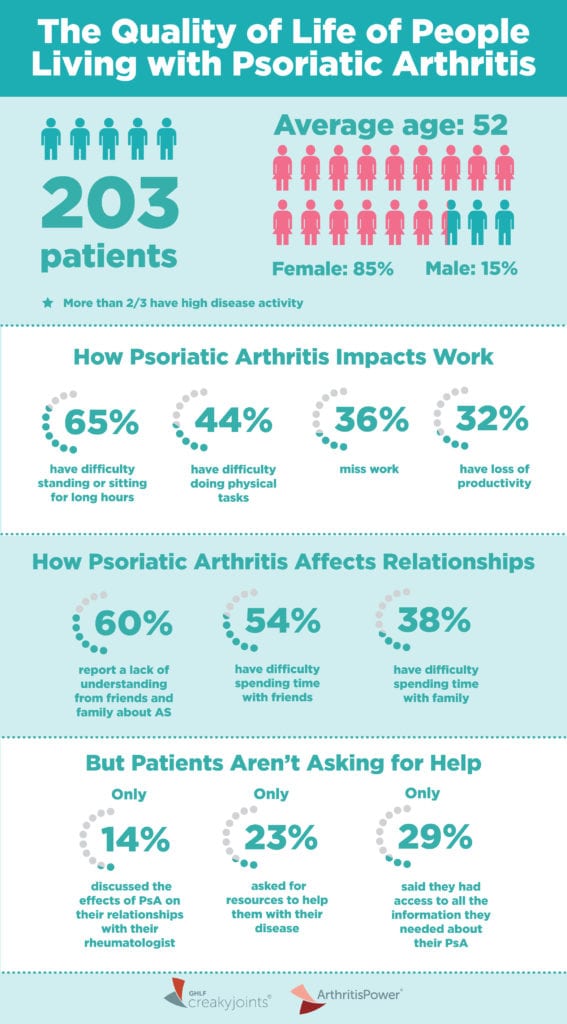When around 80 percent of people with psoriatic arthritis say they currently have joint pain, fatigue, and stiffness — not to mention a high prevalence of co-occurring health problems like depression, anxiety, and high blood pressure — it’s not exactly surprising that it might have a big impact on a person’s work and personal life.
But few real-world studies have examined the impact of psoriatic arthritis — a chronic, systemic, inflammatory disease that occurs in some patients with psoriasis — on health-related quality of life with regard to work and relationships.
In a recent study presented at the 2018 Annual Perspectives in Rheumatic Diseases Conference, researchers, including those from our nonprofit organization the Global Healthy Living Foundation, surveyed 203 psoriatic arthritis patients through our ArthritisPower research registry.
Of those, 85 percent were female, the average age was 52, and more than two-thirds of respondents reported high disease severity as assessed by the RAPID3. Overall, the study found that adults with psoriatic arthritis experienced high unemployment and a significant impact on their personal relationships.
Here are more details on what we learned.


How Psoriatic Arthritis Affects Personal Relationships
The most common impacts of psoriatic arthritis on relationships were lack of understanding from friends and family about their disease (60 percent), difficulty spending time with friends (54 percent), and difficulty spending time with family because of PsA (38 percent).
People with psoriatic arthritis are often coping with joint pain and fatigue at the same time as itchy and uncomfortable skin plaques. It can be a tough combination for social and emotional health.
Not only are people with PsA in pain and exhausted, but those with moderate to severe psoriasis plaques may also try to avoid seeing friends and family because they’re embarrassed about how their skin looks. They may avoid situations like trips to the beach or gym locker rooms where their skin could be exposed.
Around 34 percent of people in the survey said they felt a lack of support from friends and family; 30 percent said their disease affected their relationship with their spouse or partner.
How Psoriatic Arthritis Affects Your Ability to Work
Some 80 percent of respondents in the study reported being partially or completely unemployed as a result of having psoriatic arthritis.
Among the people who were still working, psoriatic arthritis affected many aspects of their daily work lives.
People reported difficulty sitting or standing for long hours (65 percent), difficulty doing physical tasks (44 percent), missing work (36 percent), and loss of productivity (32 percent).
Having psoriatic arthritis made a notable number of people in the survey adjust their jobs: Around 30 percent required accommodations at work, 24 percent said they needed to work from home, and 22 percent said they even had to switch jobs.
Talking About Psoriatic Arthritis with the Doctor
Despite the major ways psoriatic arthritis seems to affect patients’ personal and work lives, very few people with PsA in the study discussed with their rheumatologist the impact of the disease on their relationships (14 percent), or its effect on work or school (17 percent).
People were much more likely to talk to their doctor about their psoriatic arthritis symptoms and how they’re changing over time, how they’re generally feeling, and side effects from treatment.
It makes sense that during a time-crunched doctor visit you’d be likelier to talk about those subjects than how psoriatic arthritis is affecting your friendships or work colleagues, but it’s important to let your doctor know what’s happening in other areas of your life. It may be that you could benefit from seeing another specialist, like an occupational or physical therapist or a mental health professional.
Sharing more information with your rheumatologist about the impact of psoriatic arthritis on your life using an app like ArthritisPower may be beneficial to you both. It can help your rheumatologist consider whether or how to adjust your treatment or flag when it may be appropriate to connect you with other health care providers.
Getting the Right Info to Manage Psoriatic Arthritis
Another study finding was that people with PsA feel they don’t have all the info they need to live well with their disease. Overall, 49 percent reported that they did not have access to information on how to manage their fatigue; 40 percent didn’t feel like they had enough information on disease progression. Only 29 percent said that they had access to all the information they needed about their psoriatic arthritis.
“This data shows us that psoriatic arthritis has a huge impact on peoples’ daily quality of life, but PsA patients don’t always discuss the burden with their doctors, friends, and families,” says study coauthor W. Benjamin Nowell, PhD, director of Patient-Centered Research at the Global Healthy Living Foundation.
Importantly, 62 percent of people in the study reported having depression and 58 percent reported having anxiety. Previous research has found that people with PsA saw a variety of types of health care providers during the diagnosis process and often had substantial delays and misdiagnoses before they received an official diagnosis.
When a chronic disease, especially one with potentially embarrassing symptoms like psoriasis plaques or rashes, goes undiagnosed for so long, it can be isolating. You might feel like no one in your life really understands what you’re going through or how the disease affects you.
“This research also highlights an increased need for discussions between patients and their rheumatologists regarding various impacts of psoriatic arthritis,” says Dr. Nowell.
This study was done with support from Novartis Pharmaceuticals Corporation.
Keep Reading
- Download Our Free Psoriatic Arthritis Patient Guidelines
- Become a Patient Advocate in Our 50-State Network
- What Psoriatic Arthritis Feels Like: This Fitness Instructor’s Feet Were ‘Bricks at the End of My Legs’





